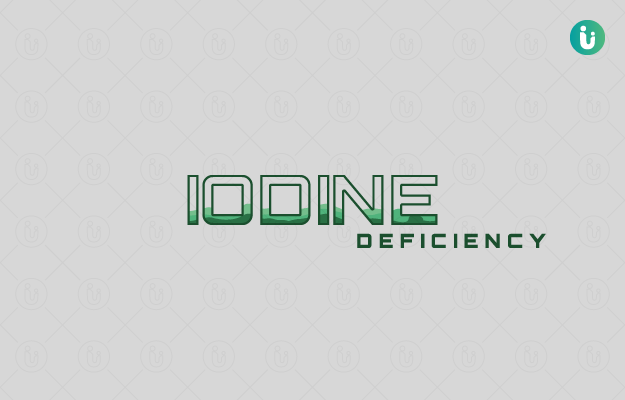What is iodine deficiency?
Iodine is a trace element and an essential nutrient in the diet. Iodine is a component of the thyroid hormones thyroxine (T4 with four iodine molecules) and triiodothyronine (T3 with three iodine molecules). Iodine is not generated in the body; hence, diet is the only source of iodine. Deficiency of iodine causes insufficient thyroid hormone production that results in hypothyroidism, goitre (enlargement of the thyroid) as well as cretinism and pregnancy-related problems. Pregnant and nursing women require 50% more iodine than the average adult and they are at high risk and are prone to iodine deficiency.
What are its main signs and symptoms?
The iodine-deficient patient might have the following symptoms that may be related to the particular clinical condition
- Brittle fingernails, coarsening and thinning of hair
- Puffy eyes, pale and dry skin
- Increased cholesterol level, muscle or joint aches, stiffness, slowed speech and loss of hearing
- Thyroid, breast, prostate and other reproductive systems–related problems
- Memory loss
- Goitre – Enlargement of the thyroid gland causes swelling in the neck, trouble breathing, swallowing and sometimes choking
- Hypothyroidism – Weight gain, fatigue, dry skin, and depression
- Pregnancy-related problems – Miscarriage, stillbirth, early birth, and congenital defects in babies
What are its main causes?
Table salt is a significant dietary source of iodine. Low salt intake in the diet, as well as low iodine in the salt, causes iodine deficiency. Iodine content in the salt is lost during cooking. Fruits and vegetables contain less or no iodine as compared to meat; therefore, a person on a vegan diet is most prone to iodine deficiency. A substantial amount of iodine is lost during exercise, causing an iodine deficiency.
How is it diagnosed and treated?
An iodine deficiency is diagnosed by checking:
- Urinary iodine – Iodine concentration is calculated from the urine. Iodine concentration in mild iodine deficiency is 50-99 mcg/L, moderate deficiency is 20 to 49 mcg/L and severe deficiency is < 20 mcg/L.
- Thyroid size – Ultrasonography is the most precise method to determine thyroid size.
- Neonatal serum thyroid-stimulating hormone (TSH) in newborns
- Serum thyroglobulin
- Radioiodine – Uptake of radioiodine is increased by thyroid due to iodine deficiency.
Treatment of iodine deficiency includes:
- Iodization of salt – Addition of iodised salt in the diet is a preferable way to treat iodine deficiency.
- Other options – Iodization of oil (lipiodol), and ingestion of iodised water and iodine tablets or drops.
- Increased intake of foods rich in iodine, such as seaweed, plain yoghurt, baked cod, milk, fish sticks, white bread, shrimp and white potato with skin.
- Avoid foods that cause low absorption of iodine by the thyroid such as soy, cabbage, broccoli and cauliflower.
Tips to increase the iodine level:
- Get rid of toxins from the body
- Increase the intake of iodine
- Ensure intake of a healthy diet

 Doctors for Iodine Deficiency
Doctors for Iodine Deficiency  OTC Medicines for Iodine Deficiency
OTC Medicines for Iodine Deficiency



















